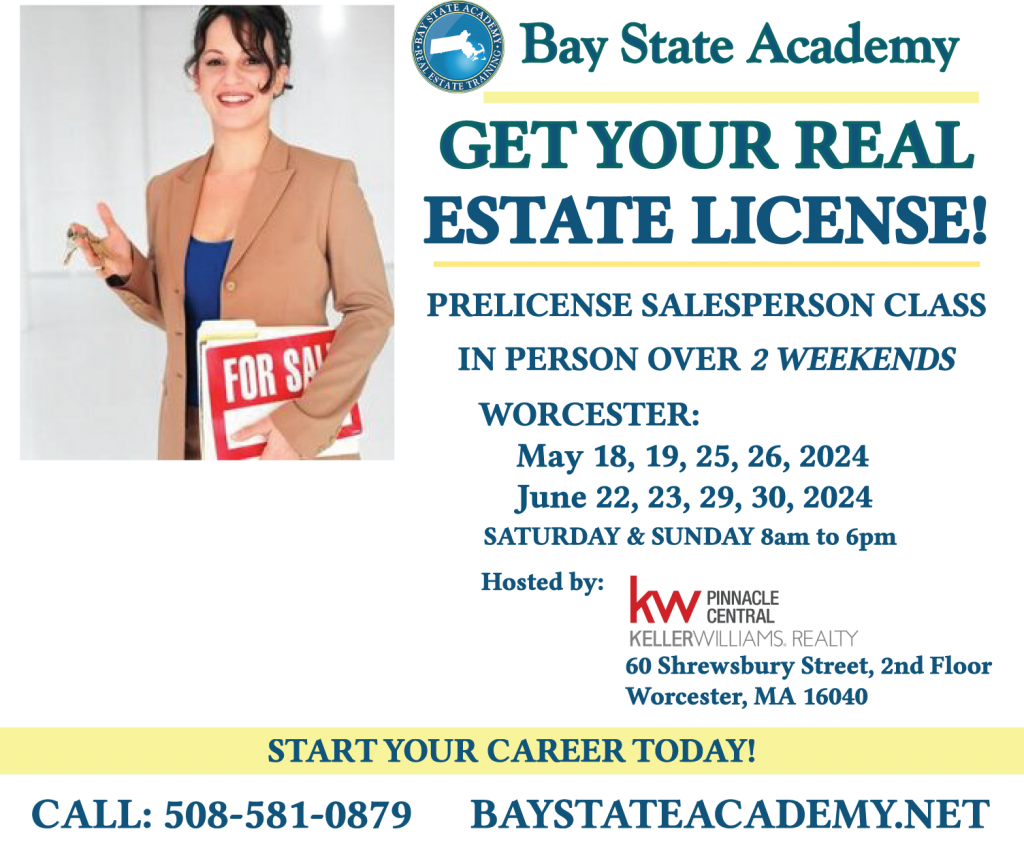This year we made it a goal to start teaching class again in person. Keller Williams Pinnacle Central in Worcester has invited us back to use their office on the weekends to teach in person classes.

This year we made it a goal to start teaching class again in person. Keller Williams Pinnacle Central in Worcester has invited us back to use their office on the weekends to teach in person classes.

This video explains all the requirements for taking the 40 hour Salesperson’s Prelicense class and taking the Prelicense Examination. People interested in getting a real estate agents license in Massachusetts should go to http://baystateacademy.net and sign up for our industry updates for more detailed information.
The Real Estate Exam in Massachusetts can be confusing but only because of the volume of real estate terms that need to be learned by the students. When I am teaching, about halfway through the first day, students will ask if they really need to know everything that we are covering for the test. I wish that I could tell them that they only need to know a few terms but that is not the case. The test covers over 1200 terms. Which can seem intimidating at first but once we get familiar with the basics things more along quite nicely.
I am sure that most Real Estate Trainers would agree that the only way you are going to pass the exam is to know the vocabulary. But how should the students go about learning the terms is the question?
I teach a technique that I call pointing the test. The exam is made up of 135 questions. There are 85 questions on the general portion of the test and 50 questions of the state portion of the exam. The students have 4 hours to complete the exam and they only need a 70% on each portion of the test to pass.
It is important to note that all of the questions are not worth the same point value but the student will not be aware of which questions are worth more points on the test. This sounds like we are going in circles until you realize that the test stresses particular subject areas.
If you go to the Pearson Vue Website and download the content outline of the test you will discover that some of the subject areas have substantially more questions than others. In talking with student both before and after their exam I have noticed a pattern.
Students that concentrated their studying on the subject areas that had more questions got higher scores on the test. I know this might sound obvious but you would be surprised how many students start studying for the test with out any focus.
So it should come as no big shock to hear that focused studying is the first part of the process that I call pointing the test. The second part of the process has to do with how the students actually take the exam. Here are the rules of the second part:
The reason that I suggest this Pointing the Test method is that it focuses the student on getting as many points as possible as fast as possible. This is important because often times a students first guess/thought about a question is the correct answer. The other benefit is that the student is reading all of the questions on the test before answering the hardest questions. Many of the description to questions on the test will give answers to other questions. This gives the best chance to get the points from those harder questions. And finally we come to the math questions. Of all the questions on the test the math questions cause more fear and dread than all the others combined. You will be happy to hear that only 10% of the questions on the test will be math questions. So if you leave these question until the end you will not be so flustered by the math that you get easy vocab questions wrong.
That is it for my suggestions try them out and let me know what you think in the comments bellow.